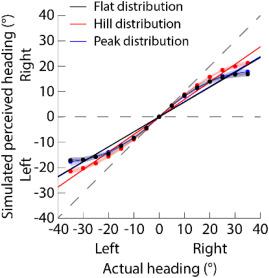Our official English website, www.x-mol.net, welcomes your feedback! (Note: you will need to create a separate account there.)
Conflicts between short- and long-term experiences affect visual perception through modulating sensory or motor response systems: Evidence from Bayesian inference models
Cognition ( IF 4.011 ) Pub Date : 2024-03-12 , DOI: 10.1016/j.cognition.2024.105768 Qi Sun , Jing-Yi Wang , Xiu-Mei Gong
Cognition ( IF 4.011 ) Pub Date : 2024-03-12 , DOI: 10.1016/j.cognition.2024.105768 Qi Sun , Jing-Yi Wang , Xiu-Mei Gong

|
The independent effects of short- and long-term experiences on visual perception have been discussed for decades. However, no study has investigated whether and how these experiences simultaneously affect our visual perception. To address this question, we asked participants to estimate their self-motion directions (i.e., headings) simulated from optic flow, in which a long-term experience learned in everyday life (i.e., straight-forward motion being more common than lateral motion) plays an important role. The headings were selected from three distributions that resembled a peak, a hill, and a flat line, creating different short-term experiences. Importantly, the proportions of headings deviating from the straight-forward motion gradually increased in the peak, hill, and flat distributions, leading to a greater conflict between long- and short-term experiences. The results showed that participants biased their heading estimates towards the straight-ahead direction and previously seen headings, which increased with the growing experience conflict. This suggests that both long- and short-term experiences simultaneously affect visual perception. Finally, we developed two Bayesian models (Model 1 vs. Model 2) based on two assumptions that the experience conflict altered the likelihood distribution of sensory representation or the motor response system. The results showed that both models accurately predicted participants' estimation biases. However, Model 1 predicted a higher variance of serial dependence compared to Model 2, while Model 2 predicted a higher variance of the bias towards the straight-ahead direction compared to Model 1. This suggests that the experience conflict can influence visual perception by affecting both sensory and motor response systems. Taken together, the current study systematically revealed the effects of long- and short-term experiences on visual perception and the underlying Bayesian processing mechanisms.
中文翻译:

短期和长期体验之间的冲突通过调节感觉或运动反应系统影响视觉感知:来自贝叶斯推理模型的证据
短期和长期经验对视觉感知的独立影响已经讨论了几十年。然而,还没有研究调查这些经历是否以及如何同时影响我们的视觉感知。为了解决这个问题,我们要求参与者估计他们从光流模拟的自我运动方向(即航向),其中在日常生活中学到的长期经验(即直线运动比横向运动更常见)发挥着重要作用。标题是从类似于峰、山和平线的三种分布中选择的,创造了不同的短期体验。重要的是,在峰、丘陵和平坦分布中,偏离直线运动的航向比例逐渐增加,导致长期和短期体验之间的冲突更大。结果显示,参与者将他们的航向估计偏向于直线前进方向和之前看到的航向,这种偏差随着经验冲突的加剧而增加。这表明长期和短期经历同时影响视觉感知。最后,我们基于两个假设开发了两个贝叶斯模型(模型 1 与模型 2):经验冲突改变了感觉表征或运动反应系统的似然分布。结果表明,这两个模型都能准确预测参与者的估计偏差。然而,与模型 2 相比,模型 1 预测了更高的序列依赖性方差,而与模型 1 相比,模型 2 预测了对直行方向的偏差更高的方差。这表明体验冲突可以通过影响视觉感知来影响视觉感知。感觉和运动反应系统。总而言之,当前的研究系统地揭示了长期和短期经验对视觉感知的影响以及潜在的贝叶斯处理机制。
更新日期:2024-03-12
中文翻译:

短期和长期体验之间的冲突通过调节感觉或运动反应系统影响视觉感知:来自贝叶斯推理模型的证据
短期和长期经验对视觉感知的独立影响已经讨论了几十年。然而,还没有研究调查这些经历是否以及如何同时影响我们的视觉感知。为了解决这个问题,我们要求参与者估计他们从光流模拟的自我运动方向(即航向),其中在日常生活中学到的长期经验(即直线运动比横向运动更常见)发挥着重要作用。标题是从类似于峰、山和平线的三种分布中选择的,创造了不同的短期体验。重要的是,在峰、丘陵和平坦分布中,偏离直线运动的航向比例逐渐增加,导致长期和短期体验之间的冲突更大。结果显示,参与者将他们的航向估计偏向于直线前进方向和之前看到的航向,这种偏差随着经验冲突的加剧而增加。这表明长期和短期经历同时影响视觉感知。最后,我们基于两个假设开发了两个贝叶斯模型(模型 1 与模型 2):经验冲突改变了感觉表征或运动反应系统的似然分布。结果表明,这两个模型都能准确预测参与者的估计偏差。然而,与模型 2 相比,模型 1 预测了更高的序列依赖性方差,而与模型 1 相比,模型 2 预测了对直行方向的偏差更高的方差。这表明体验冲突可以通过影响视觉感知来影响视觉感知。感觉和运动反应系统。总而言之,当前的研究系统地揭示了长期和短期经验对视觉感知的影响以及潜在的贝叶斯处理机制。



























 京公网安备 11010802027423号
京公网安备 11010802027423号